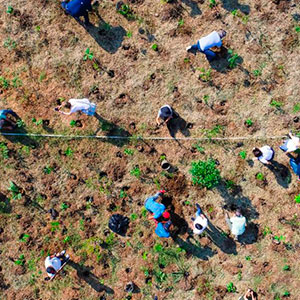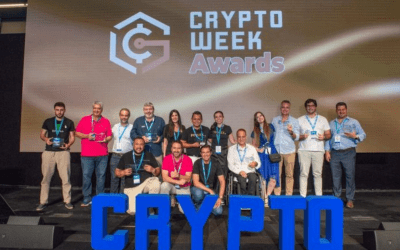Evveland Foundation has a clear goal, to contribute to the restoration of natural ecosystems by developing environmental initiatives around the globe. Put it that way, you could say there is no difference between EF and any of the dozens of existing NGOs focused on environmental issues.
But Evveland Foundation, as part of Evveland, is founded in the metaverse, which means that its goal only acquires a real dimension and significance when you add the words “blockchain, DAO and web3 ethos”.
In the same way blockchain is disrupting the business and finance world, Evveland Foundation aims to also disrupt the environmental scenario by creating a new paradigm where traditional modus operandi is no longer applicable.
Community involvement, decentralized decision making together with a continuous education of all the parties involved are the three pillars that support Evveland Foundation´s initiatives.
“Community involvement is crucial, people close to the lands know better how to restore an ecosystem, which are the native species and the impact this may have on their way of living”, says Marta Madina, President of Evveland Foundation.
The Foundation is engaging the local communities and using the EVVE tokens to incentivize the planting and caring of forests in cities around the world.
The first pilot project has been already created in the Dominican Republic by the local organization Fundación Loyola 79. The initiative aims to restore a degraded area of 7,000 m2 by applying the Miyawaki Afforestation Method, which enables fast growth and easy management of forests by using local species and close proximity planting to enable faster growth. Land preparation with nutrients and water filtering components are key for the fast growth and independence of the forests.
“In DR we have already planted a total of two thousand trees, all native species, and in less than five years we expect to have a full live ecosystem that will include three parks, two lakes and a walking path for people to enjoy and benefit from”, explains Alberto Ortiz, geologist and environmental expert, member of Fundación Loyola 79.
The planting process started in October 2021, after investing time and resources preparing the land with organic materials and installing an irrigation system. Today, they have completed 90% of the planting and it is expected to be finished by January of 2023 with a total of between five and eight thousand trees, depending on the forest density.
The cost of reforesting this area of 7,000 m2 in Dominican Republic has been US$35,000, but this does not include the development of the parks and lakes within the forest.
To financially contribute to this initiative, Evveland Foundation donated a total of 500 thousand EVVE tokens to Fundación Loyola 79, with the aim of using the funds to engage with local communities and guarantee the long-term sustainability of the project. This financial support is part of the plant-to-earn modality being developed by Evveland, which rewards the local community members for their participation in all aspects of the reforestation process.
In that sense, land movement and preparation, planting, irrigation and continuous follow-up will all be rewarded with the EVVE token, an ERC20 token minted on the Polygon chain.
In order to earn tokens, community members will have to sign-up with the Evveland Foundation and participate in the different events organized around the creation and maintenance of the forests. Once a forest site has been established, a complete schedule will be created by the botanical experts on the Evveland team, in which community members participate in order to earn tokens and also be part of the decision-making process.
The Miyawaki Method
Akira Miyawaki was a Japanese botanist who using the concept of potential natural vegetation, developed, tested, and refined a method of ecological engineering today known as the Miyawaki method to restore native forests from seeds of native trees on very degraded soils that were deforested and without humus.
Well executed, the method ensures that a forest can be self-sustaining only two years after planting the first tree. The method includes the following 10 steps, over two years.
- Investigate the terrain and surrounding native plant species
- Select list of species based on their size and create seed bank
- Establishment of nurseries for seed germination
- Delimitation and management of the site to establish the mini-forest
- Generate a design guide for planting species
- Characterization of soils and enrichment with missing elements
- Soil microbiology
- Species planting
- Maintenance
- Monitoring until self-sustaining release

Education
The Evveland Foundation has been tasked with defining and executing a blockchain-based system to involve local communities in the execution of the different steps necessary to successfully create a Miyawaki forest.
The first part of the project deals with educating the community on the intersection between the environment and the blockchain, which basically consists of creating awareness of the Miyawaki method and the use of wallets and the blockchain to establish proof of concept and participation in the different events needed throughout the lifetime of the forest.
Using its virtual event venues and with the assistance of its environmental experts, the Foundation will organize reforestation training events that will focus on involving the community in the identification of the suitable lands and the local flora in each region.
Participants in the planting events will earn EVVE tokens and constitute the spine of each local project. The Evveland Foundation membership will be composed of all EVVE NFT owners, and all EVVE Token holders.
“We do believe in distributing ownership and decision-making, so ultimately diverse communities, businesses and nations can benefit from this type of initiatives”, says Rafael Bonnelly, CEO of Evveland.
Evveland Foundation also seeks the support coming from corporations interested in adding value not only to their business, but also to their employees and ultimately to the communities and the countries they serve. Extensive research done has found a conclusive link between happiness and productivity. Happier employees tend to feel better physically and mentally, and they have more mental clarity and energy, allowing them to work more efficiently and generate creative solutions to problems. And we also know that stress is the most common cause of long-term working absence.
Taking this into consideration, the Foundation plans to organize virtual webinars and workshops to teach people how to improve their lives by returning to Nature, whether it is a traditional forest, a garden or a park in urban areas. For this reason, the Miyawaki method also includes the development of special spaces within these natural ecosystems, such as fountains, sitting, or mazes that will be built to facilitate activities including meditations, yoga, walking reflections, or mindfulness, among many others.
Most reforestation initiatives fail because of lack of maintenance and stewardship of the trees planted. Evveland Foundation aims to convert forests into ecosystems adapted to the needs of local communities, with people actively engaged, and with the additional value of converting these natural settings in places where people can relieve stress, and improve their health.



